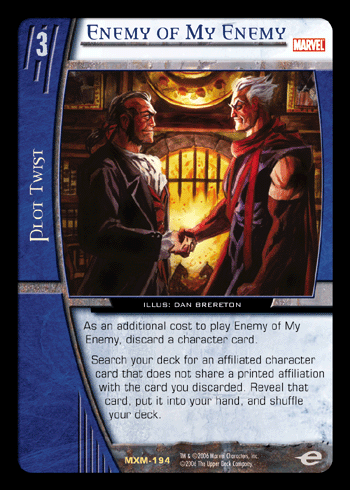
Cards that allow you to search out a hero or villain in your time of need have been staples in many popular decks. Deckbuilders around the world are always looking to add that extra bit of consistency with cards like Signal Flare; Bat-Signal; Optitron; Wild Ride; The Ring Has Chosen; Answer the Call; and Kooey, Kooey, Kooey. The Justice League set brought you two generic search effects that any deck can use. Those cards, Secret Origins and Vicarious Living, were meant to give players options when building a deck for a team that didn’t specialize in character searching. And now, here’s a search card that’s likely to change the face of Vs. as you know it.

Those of you reading are probably either very excited or wondering how on Earth we could make this card.
The events leading up to the creation of this card began while I was tuning some Mutant-based decks. I’d taken up early efforts to investigate each of the Mutant trait’s deck builds. What would an Energy deck look like? Well, one of the goals of the Mutant traits was for players to be able to treat them like teams. This meant that they would have a number of trait-stamped cards. They would behave as a bridge between teams, functioning much like willpower in that sense. Only in this case, you would have three bridges to choose from.
When we discussed how to build an Energy deck, it sounded like everyone would build an X-Men deck with as many Energy cards as possible. The Physical deck would be a Brotherhood deck with as many Physical cards as possible. The exception was the Mental deck, since there weren’t as many Mental characters and you couldn’t fill out a curve on any one team. People weren’t particularly excited about building a Mental deck as a result. So, how would we get people excited about building multi-team Mutant decks? First, we created a Team-Up specifically for Mutants. You should be able to find this card previewed elsewhere on the web today.
Besides encouraging a multi-team Mutant deck with this Team-Up, we wanted to give another strong incentive. And what better than a character search card? Well, during this process, David Baumgartner, one of our most recent R&D additions, suggested a card that said something like, “As an additional cost to play (cardname), discard a character card. Search your deck for a character card that shares a Mutant trait with that card, reveal it, put it into your hand, and shuffle your deck.” This card fit the mold of what we were looking for reasonably well, except that it didn’t specifically encourage a multi-team build. I think we both realized then that the card could force you to search for a card with a different team affiliation. (And the trick would be to refer to a printed affiliation so as not to punish you if you had a Team-Up.)
This card idea rattled around in my head for the next hour or so. Certainly, we could print another variant on a “stamped” character search effect, and this one was an appropriate fit. However, I couldn’t help but feel that this was an effect that we didn’t want to limit to just Mutants. We want our game to be open ended. While we want players to be rewarded for the consistency inherent to mono-team decks, via their team-stamped cards always working and the ability to reinforce and team attack, we also want the sky to be the limit when a player decides what to put in his or her deck.
And so, I proposed that we make this card in its current form so that it could be used in any deck running characters from more than one team.
It’s not that there haven’t been many viable team-up decks—take, for example, Common Enemy or New School—but we wanted to add another tool. Many of the viable multi-team decks have teamed-up with a team that possesses a character search effect, and we wanted to make sure that teams without access to such effects would be more likely to work with other teams.
As we provide more and more legacy content for teams, there aren’t as many “holes” in them. If you don’t like your options for a 3-drop and 5-drop on your favorite team, maybe you’ve teamed them up with another team strong at those drops. The “problem” is that we learn that players don’t like those particular drops and then provide them with new options so that they can make a better mono-team deck. If we are successful with these options, players have even less reason to team-up. And so, for players who want to build multi-team decks, we bring you cards such as Enemy of My Enemy.
It should prove interesting to see how many people use Enemy of My Enemy simply to splash a powerful character or two from other teams. And in turn, players may try to keep these strategies in check with cards like Betrayal.
Enemy of My Enemy opens so many doors in deckbuilding that we here in R&D couldn’t begin to test them all. I’m very eager to see what you come up with.
Tomorrow's Preview: